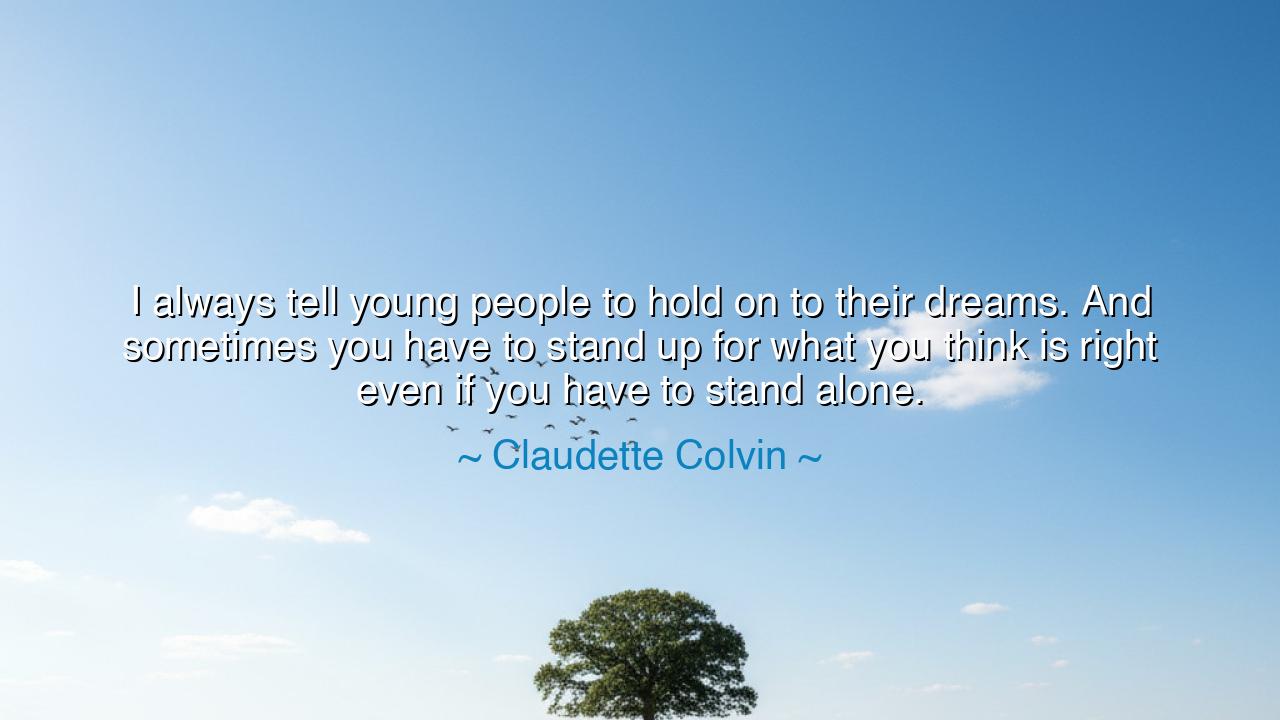
I always tell young people to hold on to their dreams. And
I always tell young people to hold on to their dreams. And sometimes you have to stand up for what you think is right even if you have to stand alone.






"I always tell young people to hold on to their dreams. And sometimes you have to stand up for what you think is right even if you have to stand alone." These words by Claudette Colvin carry a timeless message of courage and integrity. They are a call to hold fast to one's dreams, no matter how difficult the journey may be, and to stand for what is right, even when the world seems to turn against you. Colvin, who became a pioneer in the Civil Rights Movement at just fifteen years old, understood the power of individual action. She knew that while standing alone in the face of adversity is not easy, it is in those moments of solitude that true bravery is often forged.
In the ancient world, heroes were celebrated not for their conformity, but for their ability to stand firm in their beliefs, even when they were isolated. Socrates, for instance, chose to face death rather than abandon his pursuit of truth. He stood alone in his conviction that the pursuit of wisdom was worth more than life itself. When condemned by the Athenian court for “corrupting the youth,” Socrates did not yield to the pressure to conform, for he believed that it was not the will of the people, but the truth itself that should guide one’s actions. Much like Colvin’s defiance in the face of injustice, Socrates’ decision to stand alone illustrates that integrity and honor often come at great personal cost.
Similarly, Aristotle, the great Greek philosopher, believed that true virtue was not determined by popular opinion, but by righteousness and moral fortitude. He taught that a person of great character must act according to what is right, not what is easy or accepted by society. He argued that to stand for justice often means standing alone, for society’s norms can be misguided and oppressive. Like Claudette Colvin, Aristotle recognized that the path of virtue is not always the one that brings immediate comfort or acceptance. Sometimes, it is the act of standing alone in one’s convictions that leads to true change and lasting impact.
The story of Claudette Colvin herself is a shining example of this very principle. On March 2, 1955, Colvin, at just fifteen years old, refused to give up her seat on a segregated bus in Montgomery, Alabama, months before Rosa Parks became famous for her own act of defiance. Colvin’s act of resistance was not the result of a pre-planned political statement, but an innate sense of rightness. She was a young girl standing alone, and yet she embodied the strength to do what she felt was just in the face of overwhelming societal pressure. Though she did not immediately receive the recognition she deserved, Colvin’s courage would help lay the groundwork for the larger Civil Rights Movement, proving that standing for justice, even in solitude, can spark a transformative wave of change.
History also provides us with the example of Mahatma Gandhi, who stood alone against the might of the British Empire. His philosophy of nonviolent resistance was rooted in his deep belief in truth and justice, even when it put him in direct opposition to the colonial rulers of India. Gandhi’s commitment to satyagraha—the force of truth—was not driven by a desire for personal gain, but by a moral obligation to stand for what was right, regardless of the outcome. His example, like Colvin’s, teaches us that courage and integrity are more powerful than any external force, and that even when we stand alone, we can change the world.
Claudette Colvin’s words are not only a call to the young, but to all of us, to hold firm to our dreams and our beliefs, especially when the world around us seeks to discourage us. It is easy to give in to the pressure of conformity, to follow the path of least resistance, but true greatness is born from the willingness to stand alone for what we know is right. The lesson here is profound: stand firm in your convictions, even when the path is lonely, because it is in these moments of solitude that we often find our greatest strength.
In our own lives, let us take inspiration from Claudette Colvin, Socrates, and Gandhi. Let us never abandon our dreams, no matter how difficult the road ahead may seem. Let us embrace the courage to stand up for justice, even when we must stand alone. Whether in our personal relationships, our careers, or in the fight for a greater cause, let us remember that true fulfillment comes from staying true to ourselves and our moral compass. Integrity, courage, and self-belief are the foundation of every meaningful life. When we stand firm in our convictions, even in solitude, we not only honor ourselves but become catalysts for positive change in the world.






AAdministratorAdministrator
Welcome, honored guests. Please leave a comment, we will respond soon